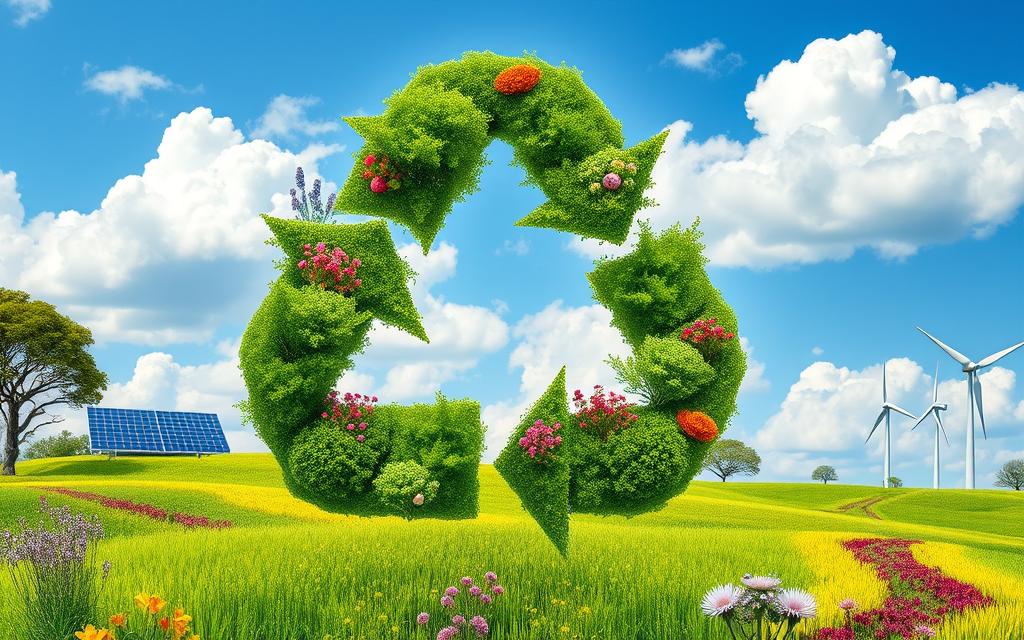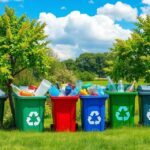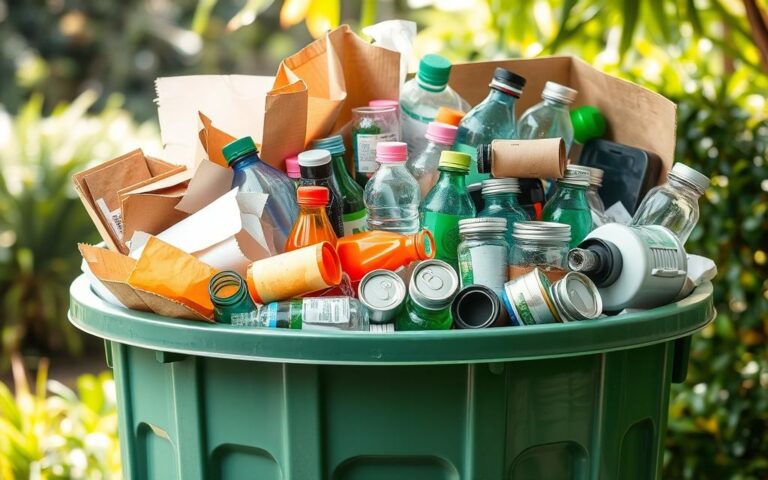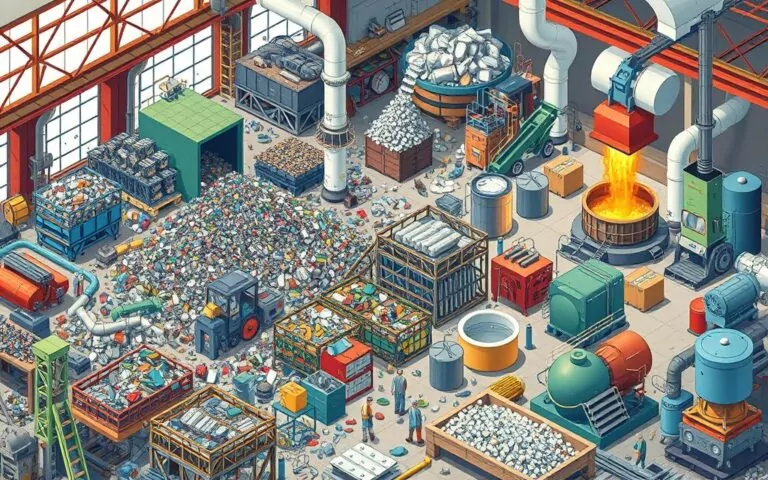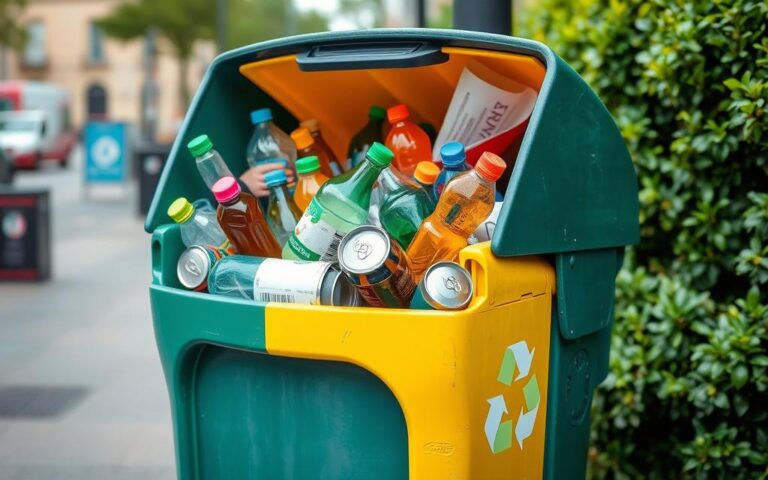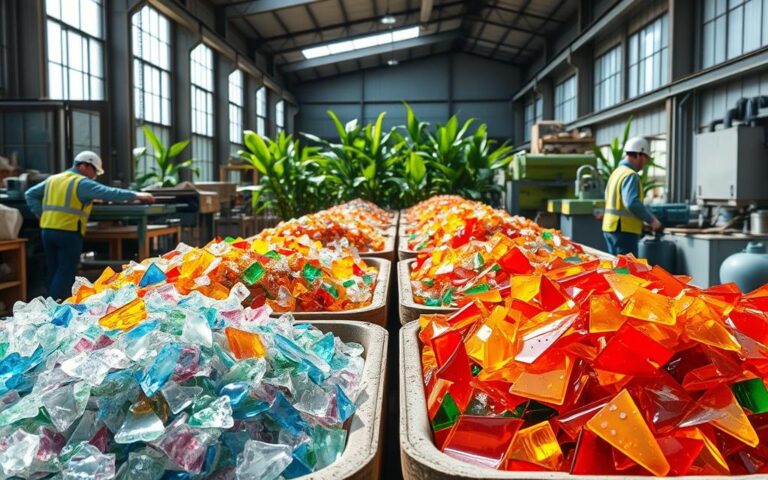Why Must We Recycle? The Importance of Sustainability
Recycling is key for our planet’s future. The UK wants to recycle 65% of waste by 2035. But now, we’re at about 45%.
It saves natural resources and protects animals and plants. It also cuts down on energy use and carbon emissions. Plus, it’s cheaper than throwing things away.
Recycling helps young people find jobs in green fields. It’s all about reducing, reusing, and recycling to keep our planet safe.
Key Takeaways
- Recycling is essential for sustainable resource management and environmental protection.
- The UK government has set a target of 65% municipal waste recycling by 2035, but the current rate is around 45%.
- Recycling conserves natural resources, reduces energy usage, and lowers carbon emissions.
- Recycling creates green jobs and tackles youth unemployment.
- The recycling process involves reducing, reusing, and recycling materials to minimise waste.
Understanding the Current State of Global Waste Crisis
The world is facing a global waste crisis on a massive scale. With more people and consumption, waste has grown incredibly. Over 2 billion tons of waste are made every year, and this number is set to jump by 70% by 2050.
The UK’s Recycling Targets and Challenges
In the UK, the aim is to recycle 65% of household waste by 2035. But now, only about 45% is recycled. To hit these targets, more money, better infrastructure, and changes in how we consume are needed.
Global Waste Management Statistics
Across the globe, the situation is dire. In Latin America and the Caribbean, 145,000 tons of trash are dumped daily. Plastic kills over 1 million seabirds and more than 100,000 marine mammals yearly. Methane from waste is 80 times worse than carbon dioxide, yet only 2% of climate funds go to methane reduction.
Environmental Impact of Poor Waste Management
Poor waste management harms our environment badly. It pollutes air, water, and soil, harms ecosystems, and fuels climate change. Waste is behind 20% of methane emissions, a potent greenhouse gas. We must act fast to fix this and move to better waste management.
Why Must We Recycle: Essential Benefits for Our Planet
Recycling is key to saving our planet. It helps us conserve natural resources, protect ecosystems, and reduce pollution. These actions are vital for our Earth’s health.
Recycling saves natural resources. It means we don’t need to get new raw materials. For example, making aluminium from recycled materials uses 95% less energy than making it from scratch. Steel made from recycled materials saves about 70% energy.
Recycling also helps protect our ecosystems. It reduces the need to extract resources, which keeps forests, rivers, and wildlife safe. This helps keep our ecosystems balanced, protecting vulnerable species and our planet’s health.
Recycling also cuts down on pollution. It keeps materials out of landfills and incinerators, reducing harmful emissions. Recycling is 194 times better at cutting greenhouse gas emissions than landfills and incinerators.
By recycling, we can really help our planet. It saves resources, protects ecosystems, and lowers pollution. Recycling is a simple way for us to help create a greener future.
The Economic Advantages of Recycling
Recycling brings big economic wins, not just for the planet. It creates jobs and boosts the economy. In the UK, the recycling sector has grown, adding 90,000 jobs from 2014 to 2019. Now, it employs nearly 560,000 people.
Job Creation and Economic Growth
The recycling industry is key in creating green jobs. Recycling 10,000 tons of waste can create 36 jobs, more than landfilling the same amount. The National Recycling Coalition says recycling has made 1.1 million jobs, $236 billion in sales, and $37 billion in payroll in the US.
Cost Savings for Communities
Communities save money by recycling. For example, Lambeth Council in London finds it six times cheaper to recycle than throw away waste. This lets them spend more on important public services, improving life for everyone.
Business Opportunities in Recycling Industry
The recycling industry offers many business opportunities for growth. It needs experts in research, design, and marketing, creating jobs for skilled workers. Using recycled materials also gives businesses a green edge, boosting green industries.
Working together, businesses, governments, and non-profits can grow the recycling industry. This leads to new business models and market chances. Even though starting recycling can cost money for training and equipment, the long-term gains are worth it.
“Recycling one ton of aluminum can save up to 8 tons of bauxite ore and 14,000 kilowatt-hours of energy. Recycling one ton of paper can save up to 4,100 kilowatt-hours of energy.”
When looking at recycling’s return on investment (ROI), consider the money it can make, save, and the good it does for your reputation. By taking advantage of recycling’s economic benefits, we can help build a sustainable, circular economy. This benefits both our planet and our economy.
Energy Conservation Through Recycling
Recycling is key in saving energy and cutting down carbon emissions. It’s amazing how much energy we save by recycling different materials. This helps a lot in the fight against climate change and makes managing resources better.
For example, making new aluminium from recycled materials uses 95% less energy than starting from raw materials. Recycling steel needs about 70% less energy than making it from scratch. And, using recycled paper instead of wood pulp saves 40% of energy.
Recycling also saves a lot of energy in other ways. Recycling one glass bottle can light a 100-watt bulb for up to 4 hours. This shows how recycling can lead to big energy savings, lower carbon emissions, and better resource efficiency.
| Material | Energy Savings from Recycling |
|---|---|
| Aluminium | 95% |
| Steel | 70% |
| Paper | 40% |
| Glass | Equivalent to powering a 100-watt light bulb for 4 hours |
These big energy savings mean less carbon emissions. This helps in the global fight against climate change. By recycling, we all help save resources and work towards a greener future.
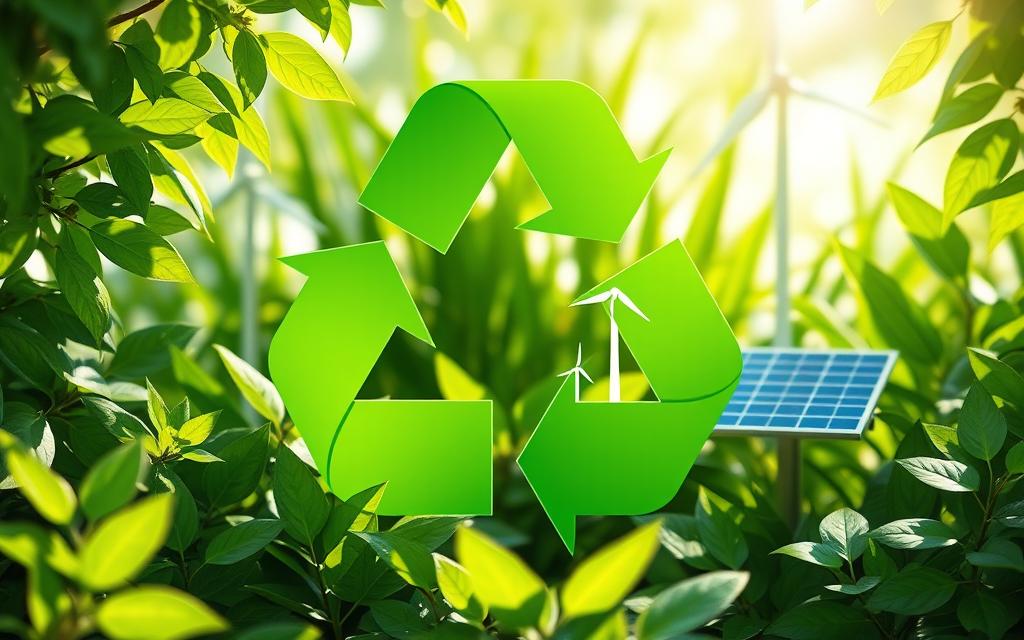
The Three Rs: Reduce, Reuse, Recycle Process
The recycling process is key to managing waste sustainably. It involves three main steps: reducing, reusing, and recycling. These steps help lessen waste’s harm to the environment and support a circular economy.
Collection and Processing Methods
The recycling journey starts with collecting and processing recyclables. Curbside collection, drop-off centres, and deposit schemes help gather recyclables. Then, these materials are sorted, cleaned, and prepared for making new products.
Manufacturing with Recycled Materials
Today, many products use recycled materials. This cuts costs and environmental harm. For instance, plastic from milk jugs becomes decking and stadium seats. Corrugated cardboard turns into paper bags and paperboard.
This closed-loop system is vital for waste reduction and sustainable consumption.
Sustainable Consumer Choices
Consumers are crucial in recycling by choosing eco-friendly options. Buying products with recycled content and using reusable bags help. Stores may give discounts for these choices, encouraging more eco-friendly actions.
The three Rs – Reduce, Reuse, Recycle – are the best way to manage waste and cut emissions. By adopting this approach, we can ensure a sustainable future and protect our planet for future generations.
Conclusion
Recycling is key to a sustainable future. It saves natural resources, protects our environment, and creates jobs. It also saves a lot of energy. Our current way of producing, using, and throwing away things is not sustainable.
We must change how we view waste. By recycling and adopting sustainable practices, we can protect our planet. This ensures a better world for our children and grandchildren.
Switching to a recycling-based economy is good for both the planet and our wallets. Recycling helps people and the environment in many ways. In the U.S., recycling keeps 35% of trash out of landfills. It also saves enough energy to power 14 million homes for a year.
Even though recycling might not always save money, its benefits are huge. It’s good for the environment and society. By taking responsibility for our planet, we can build a sustainable future.
FAQ
Why is recycling crucial for the future health of our planet?
Recycling is key for our planet’s health. It saves natural resources and protects wildlife. It also cuts down on energy use and carbon emissions. Plus, it creates jobs and is more cost-effective than throwing things away.
What are the UK government’s recycling targets and the current recycling rate?
The UK wants to recycle 65% of waste by 2035. But now, we’re at about 45%. Recycling is a big step towards a greener future.
What are the benefits of recycling?
Recycling saves resources and protects our environment. It reduces pollution and helps communities affected by mining. It also creates more jobs and boosts the economy.
How does recycling contribute to energy conservation?
Recycling cuts down energy use in making new products. Making aluminium from recycled metal uses 95% less energy. Steel recycling saves about 70% of energy. These savings help fight climate change.
What are the main steps in the recycling process?
Recycling has three main steps: collecting, processing, and making new products. We collect waste through curbside bins and recycling centres. Then, it’s sorted and cleaned for use in making new items.
How can individuals contribute to the recycling process?
Consumers can help by choosing products made from recycled materials. This completes the recycling loop. By recycling, we protect our planet and save resources for the future.

